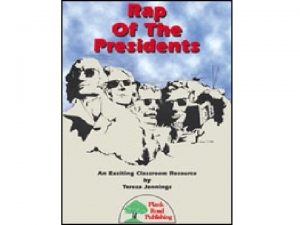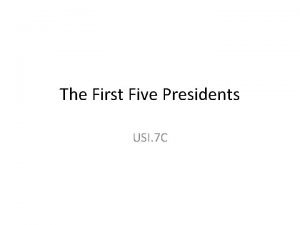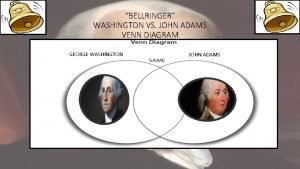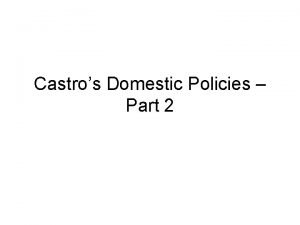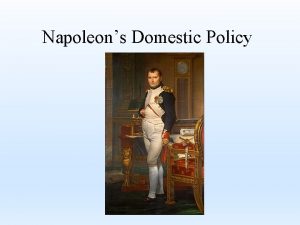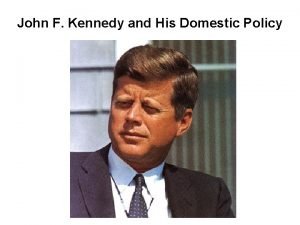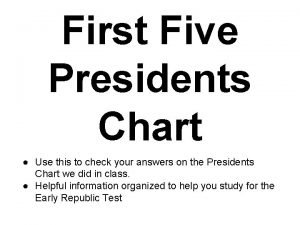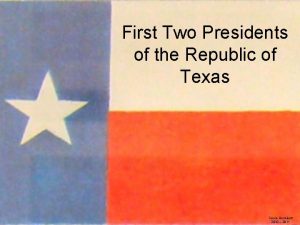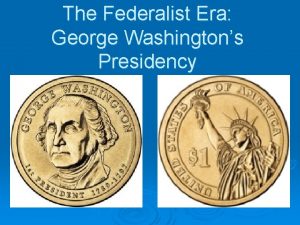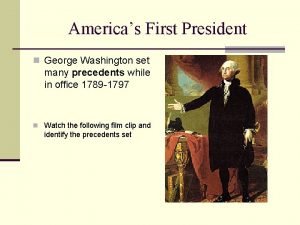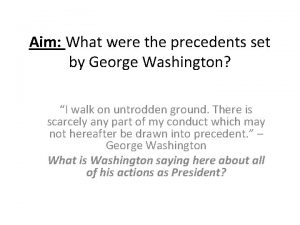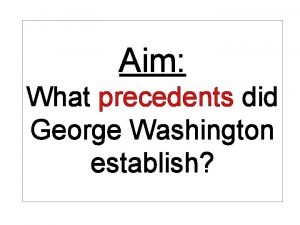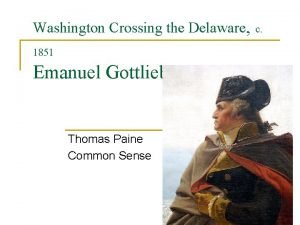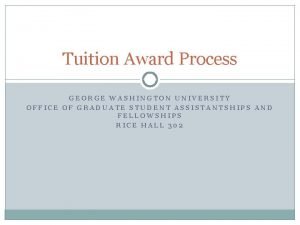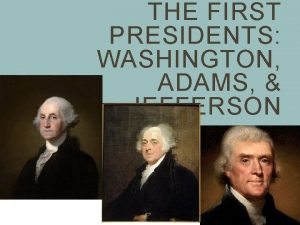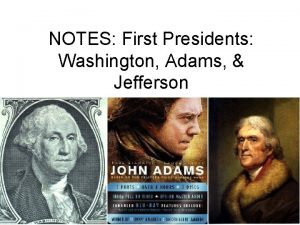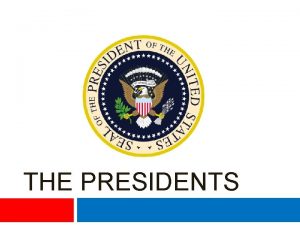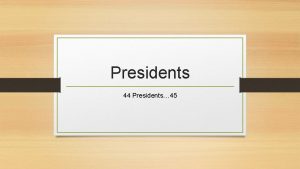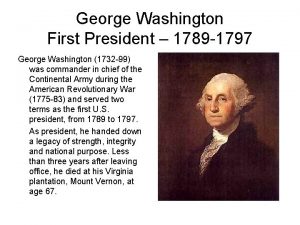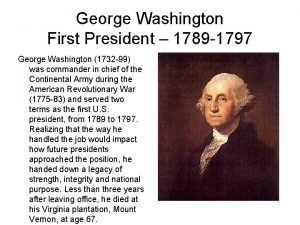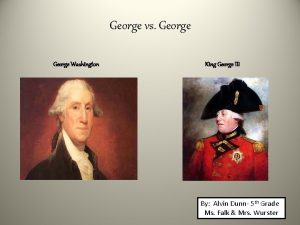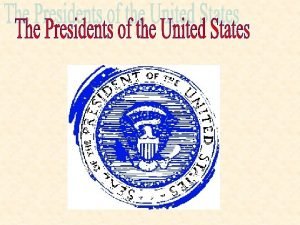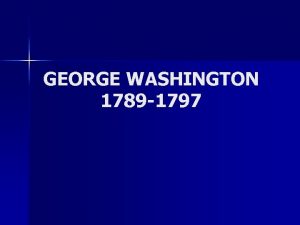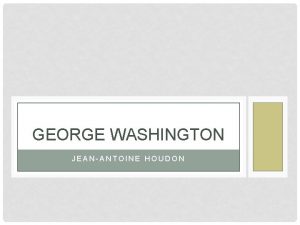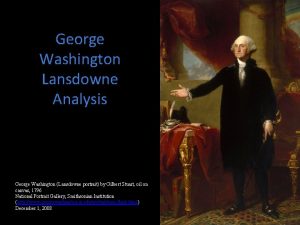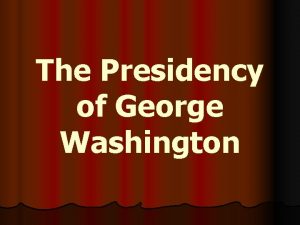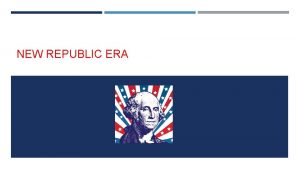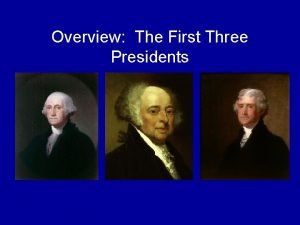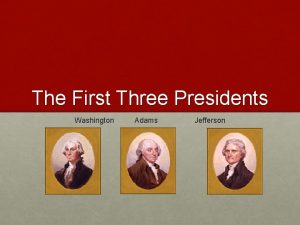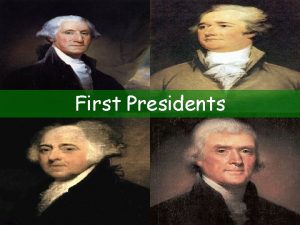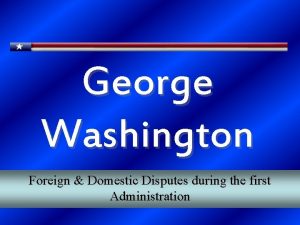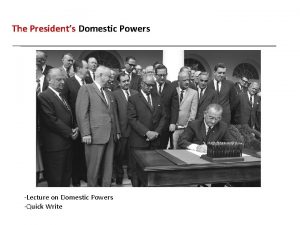FIRST FIVE PRESIDENTS George Washington Domestic Policies Creation



























- Slides: 27

FIRST FIVE PRESIDENTS

George Washington

Domestic Policies � Creation of the Cabinet to help make decisions. � Suppression of the Whiskey Rebellion

Whiskey Rebellion � Congress imposed a tax on the manufacture of Whiskey (1791) � Enraged Western farmers � Whiskey was used as a medium of exchange � 1794 – A rebellion erupted � Western Pennsylvania farmers terrorized tax collectors, stopped court proceedings, robbed the mail, destroyed whiskey-making stills � Establish the authority of the federal government � Sent 15, 000 troops to crush the Whiskey Rebellion. � Huge army caused rebels to disperse without a fight.

Foreign Policies � French Revolution erupted in 1789 �Federalists – opposed the French �Democratic-Republicans – supported the French � Jay’s Treaty � Pinckney’s Treaty

Jay’s Treaty � British navy began intercepting all neutral ships carrying goods to French. � Did not want to fight Britain/U. S. � Jay’s Treaty: �Britain had the right to seize cargoes bound for French ports �Issue submitted to international arbitration �U. S. : Most-favored nation status (merchants not discriminated against)

Pinckney’s Treaty � Negotiations with Spain (still controlled Florida, and West of the Mississippi) � AKA Treaty of San Lorenzo � Granted the United States the right to navigate the Mississippi and to deposit goods at the port of New Orleans. � **CONTROL OF THE MISSISSIPPI**

Washington’s Farewell Address � Warned against: Sectionalism – to avoid dividing the country into North against South or East against West. � Warned against: Political Parties � Warned against: Foreign Relations

John Adams

Domestic Policies � Alien and Sedition Acts � Virginia & Kentucky Resolutions

Alien & Sedition Acts � Aliens – people living in the country who were not citizens �Many recent immigrants were from France (anti- British) would vote for Democratic-Republicans. Made immigrants wait 14 years before becoming citizens (to weaken Republican support) � Gave the president power to deport any alien deemed dangerous to the U. S. � Sedition – incitement to rebellion. � �Federal crime to utter or print anything “false, scandalous” against the government.

Virginia & Kentucky Resolutions � The idea that since states had created the Constitution, they could declare federal laws unconstitutional � Interposition – stop the illegal action by the federal government. � Nullification – the states could nullify (declare invalid) any federal law � Secretly written by Jefferson and Madison (against Alien & Sedition Acts)

Foreign Policy � XYZ Affair � Quasi-War: France had begun stopping American ships and seizing their goods if they were going to Britain � Undeclared war at sea: suspended trade with France and directed navy to capture armed French ships.

XYZ Affair � Neutrality toward conflict in Europe � French navy was seizing American ships at sea. � French diplomats (identified as X, Y, Z) demanded bribes for their assistance in stopping the French government.

Election of 1800

Turning Point � Federalists had controlled the army, presidency, and Congress � Power could be peacefully transferred between parties. � Adams (Federalist) Jefferson (Democratic-Republican)

Thomas Jefferson

Domestic Policies � Marbury v. Madison � Louisiana Purchase � Lewis and Clark Expedition

Louisiana Purchase � The U. S. bought Louisiana from France for $11. 25 million. � U. S. more than doubled in size � Gained control of entire Mississippi

Lewis and Clark Expedition � Secret expedition to find a route to the Pacific Ocean � Chose: Meriweather Lewis (private secretary) and William Clark to lead the expedition

Foreign Policies � Concerned with keeping the U. S. out of the war between Britain and France � Napoleon had crowned himself Emperor of France � Impressment of American sailors and cargo ships delivering goods to France.

James Madison

Domestic Policies � Native Americans in the Great Lake regions were persuaded by leader (Tecumseh) to fight the settlers.

Foreign Policies � War sea of 1812 – defending U. S. rights at

James Monroe

Domestic Policies � “Era of Good Feelings” - harmony in national politics – The Republicans � Sectional disputes – �Slavery: Missouri Compromise �Party Politics – Democratic-Republican party split � Mc. Culloch v. Maryland � Gibbons v. Ogden

Foreign Policies � Monroe Doctrine – �Western Hemisphere was closed to any further colonization by a European power �U. S. would firmly oppose attempts by a European power to intervene in the affairs of the Western Hemisphere �The U. S. would not involve itself politically in the affairs of Europe �Isolationist/Neutral Sentiment
 These are the presidents the mighty mighty presidents
These are the presidents the mighty mighty presidents Thomas jefferson acrostic poem
Thomas jefferson acrostic poem George washington vs king george iii
George washington vs king george iii George washington and thomas jefferson venn diagram
George washington and thomas jefferson venn diagram Fear be conquered
Fear be conquered Eisenhower's domestic policy
Eisenhower's domestic policy Castro's domestic policies
Castro's domestic policies Napoleon bonaparte domestic policies
Napoleon bonaparte domestic policies Domestic policies of napoleon
Domestic policies of napoleon John f kennedy domestic issues
John f kennedy domestic issues 1st five presidents chart
1st five presidents chart Presidents of the republic of texas
Presidents of the republic of texas George washingtons domestic policy
George washingtons domestic policy Supply demand matching
Supply demand matching Bottle buddy school project
Bottle buddy school project George washington dixon
George washington dixon George washingtons phobia
George washingtons phobia George washington socks chapter 17
George washington socks chapter 17 George washington socks chapter 11
George washington socks chapter 11 George washington nose
George washington nose Precedents george washington set
Precedents george washington set Precedents set by george washington
Precedents set by george washington George washington precedents
George washington precedents George karani
George karani George washington crossing the delaware painting
George washington crossing the delaware painting Gwu student accounts office
Gwu student accounts office Gwu electrical engineering
Gwu electrical engineering Curious george washington
Curious george washington
